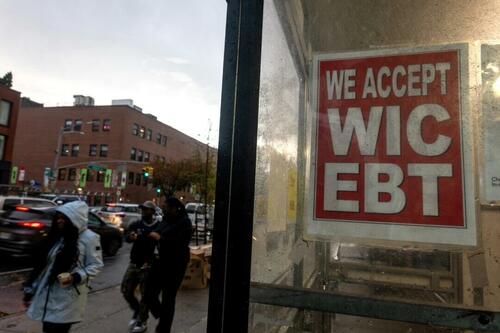Trump Admin Redirects Tariff Revenue To Fund WIC As Shutdown Drags On
Authored by Kimberley Hayek via The Epoch Times,
As the federal government shutdown reaches its 35th day, the Trump administration has transferred $450 million from tariff windfalls to a nutrition program for women, infants, and children.
The funds, taken from a fund for agricultural commodity and disaster aid, were sent to the Special Supplemental Nutrition Program for Women, Infants, and Children (WIC) on Oct. 31, according to White House Office of Management and Budget records.
The money will be used for approximately three weeks of benefits for nearly 7 million pregnant or breastfeeding women, or other Americans with young children who use WIC for food, counseling, and support, according to the National WIC Association.
This latest monetary injection comes on the heels of a comparable move in mid-October, when the U.S. Department of Agriculture (USDA) tapped the same tariff-derived fund, which has in it more than $23 billion from customs duties as of early October, for $300 million to keep WIC afloat for two more weeks. State agencies are set to receive the funds in the coming days, the association added.
Meanwhile, benefits under the Supplemental Nutrition Assistance Program (SNAP), or food stamps, ran out Nov. 1, the first time in the program’s 60 years, leaving nearly 42 million recipients without transfer payments as neither Congress nor the administration earmarked funds for them ahead of the shutdown, which started on Oct. 1.
The administration revealed Monday that it would use emergency funds in part to pay for November SNAP benefits. Certain states, however, may require weeks or months to fully distribute them.
USDA officials worried that funding SNAP could shortchange WIC and other programs specifically targeting low-income children.
“Creating a shortfall in Child Nutrition Program funds to fund one month of SNAP benefits is an unacceptable risk, even considering the procedural difficulties with delivering a partial November SNAP payment, because shifting $4 billion to America’s SNAP population merely shifts the problem to millions of America’s low income children that receive their meals at school,” Patrick Penn, deputy undersecretary for food, nutrition, and consumer services at the USDA, said in the filing.
In early October, the administration invoked Section 232 authority to send $300 million to WIC for temporary nutritional support for at-risk families during the funding standoff. The administration also moved to support farmer aid by reopening USDA offices despite the shutdown.
Judges have sided with the federal government amid agency pushback against the administration’s invoking its authority to deploy the funds. Two federal judges on Oct. 31 ruled that the USDA is required to tap emergency funds to disburse food stamps, dismissing the agency’s claims that it does not have enough resources. The orders noted SNAP is an entitlement program, which means the government is legally required to make payments to eligible households, regardless of whether the government is shut down.
Judges highlighted $6 billion in congressionally appropriated contingency reserves, such as $3 billion earmarked through fiscal 2026, that could be used to cover benefits, negating USDA memos that suggested the funds could not be used amid a government shutdown.
In a complaint filed on Oct. 28, numerous states alleged that the USDA’s reasons for suspending SNAP were misleading, arguing that “they offer no evidence that contingency funds are not available.”
The suit underscored irreparable harm incurred, arguing that states were paying added administrative costs due to the lapse in funding, and food banks were seeing a spike in demand. California, for instance, sent $80 million in state funds for pantries. Colorado sought $10 million and Minnesota earmarked $4 million in emergency aid, according to the filing. The states also argue that the payment lapse violates the Food and Nutrition Act.
“We anticipate the disruptions in SNAP may lead additional families to certify [for] WIC or families to run through their WIC benefits faster, so we will be keeping a really close eye on these resources because we know that WIC can’t fill the gap that SNAP plays for families,” said Nell Menefee-Libey, senior public policy manager at the NWA.
The administration has defended prioritizing WIC and child nutrition over full SNAP funding from tariff revenues, pointing to past shutdown strategies where SNAP continued without interruption.



